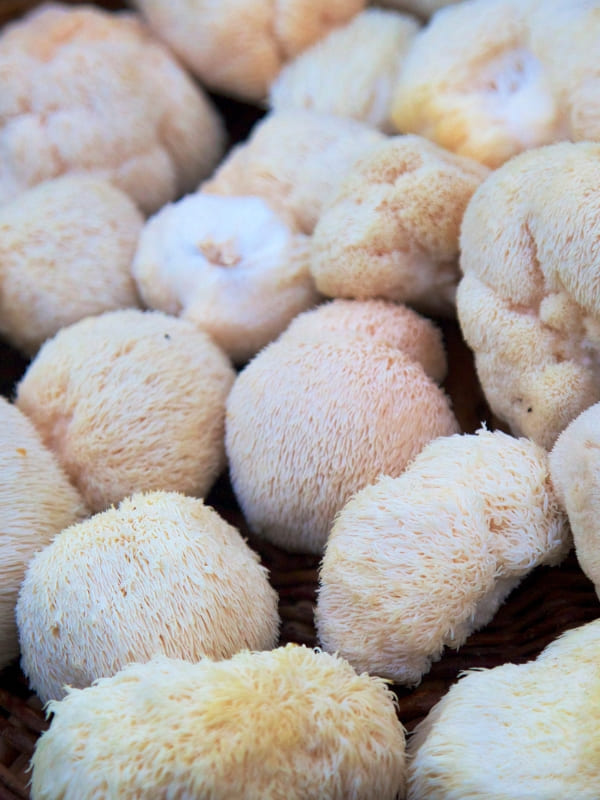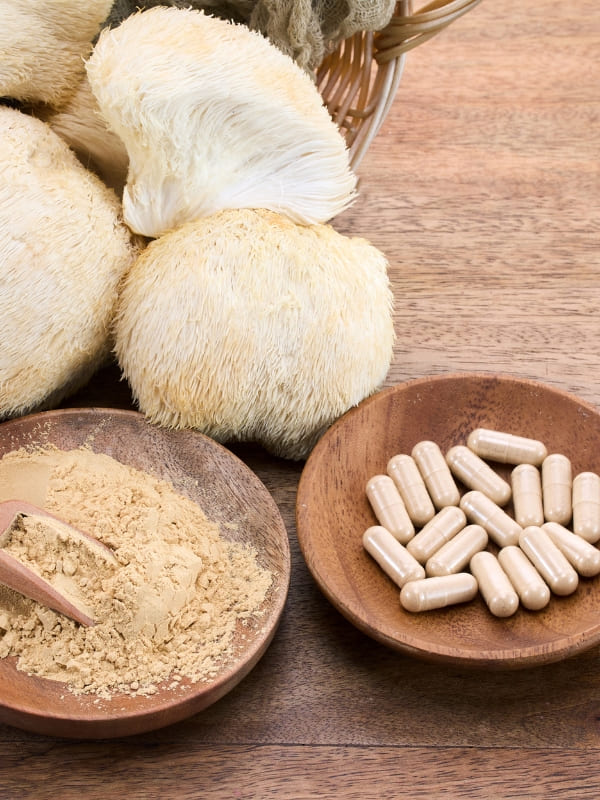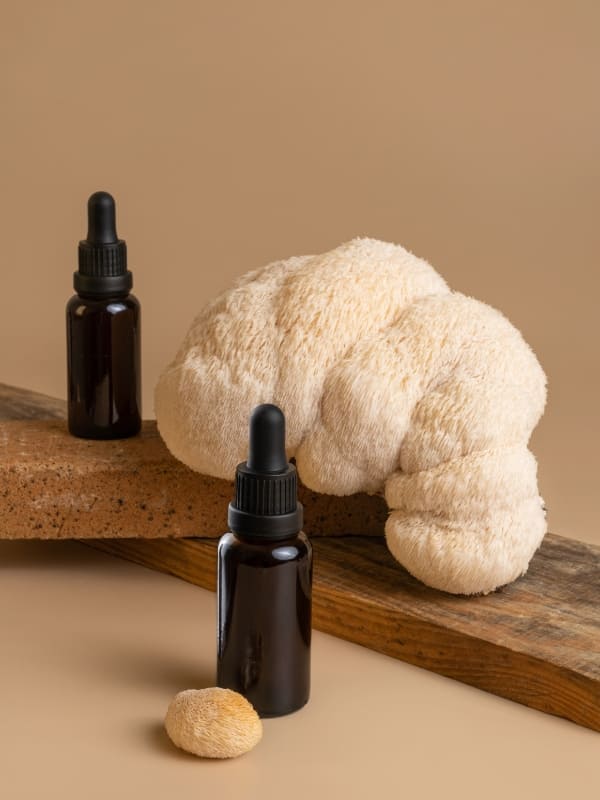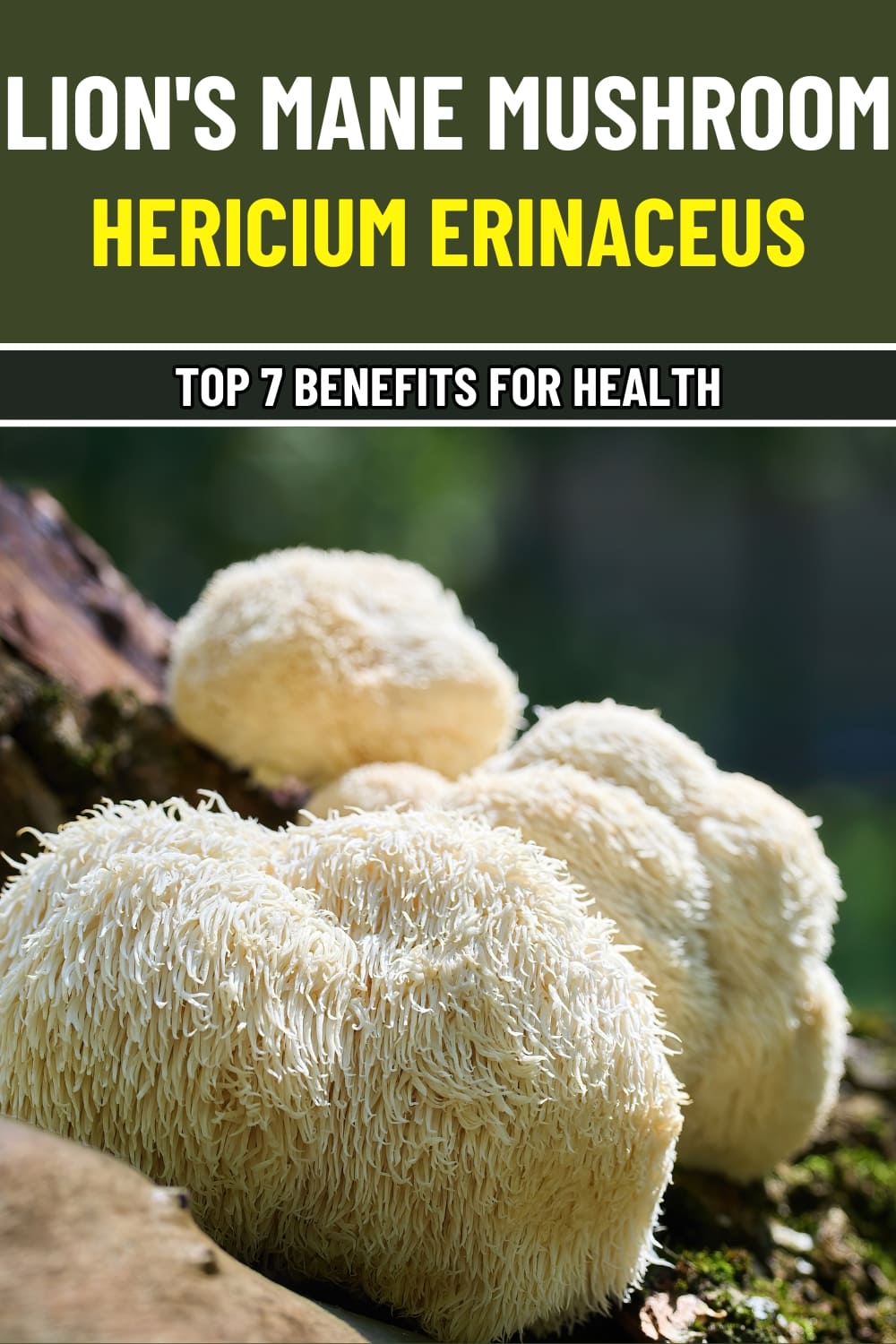Lion’s Mane Mushroom (Hericium erinaceus) isn’t just a feast for the eyes with its cascading, shaggy white strands.
Known as “Nature’s Nootropic,” this extraordinary fungus has been celebrated for centuries in Traditional Chinese Medicine (TCM) and is now backed by modern research for its remarkable health benefits.
Whether you’re seeking mental clarity, improved digestion, or a natural way to manage stress, Lion’s Mane might just be the superfood you’re looking for. Let’s explore how this incredible mushroom can transform your health.
#1. Enhances Brain Health and Cognitive Function
Lion’s Mane is often referred to as “food for the brain” for a good reason. It contains bioactive compounds like hericenones and erinacines, which stimulate the production of Nerve Growth Factor (NGF).
NGF plays a crucial role in repairing and regenerating neurons, which can enhance cognitive function, memory, and learning capacity.
Moreover, studies have shown that Lion’s Mane may help prevent cognitive decline associated with aging.
A clinical trial conducted in Japan found that adults aged 50–80 who consumed Lion’s Mane experienced significant improvements in cognitive function over 16 weeks compared to a placebo group.

#2. Supports Nervous System Recovery
The nervous system relies on myelin, a protective sheath around nerve cells, to transmit signals effectively.
Lion’s Mane helps the body repair and regenerate damaged nerves, making it beneficial for conditions like peripheral neuropathy and even spinal injuries.
Its unique compounds, hericenones and erinacines, stimulate the synthesis of NGF, which promotes nerve growth and repair.
Regular consumption of Lion’s Mane could support faster recovery from nerve damage and help maintain the overall health of your nervous system.
#3. Boosts Immune Cell
Lion’s Mane is rich in beta-glucans and other polysaccharides, which are known to enhance immune cell activity. These compounds activate macrophages and natural killer cells, strengthening the immune response against pathogens.
Additionally, beta-glucans contribute to overall immune balance, ensuring that your body can fight infections effectively without triggering excessive inflammation.
With its immune-modulating properties, Lion’s Mane is a valuable addition to your wellness routine, especially during cold and flu seasons.

#4. Promotes Gut Health
Gut health is directly connected to your overall well-being, and Lion’s Mane plays a significant role in supporting a healthy digestive system. Its prebiotic properties help nourish beneficial gut bacteria, promoting a balanced microbiome.
Furthermore, Lion’s Mane is known to soothe gut inflammation, which can improve nutrient absorption and reduce symptoms of digestive disorders like irritable bowel syndrome (IBS).
By strengthening your gut barrier, this mushroom also enhances immunity and reduces the risk of leaky gut syndrome.

#5. Provides Powerful Antioxidant Support
Oxidative stress, caused by free radicals, can accelerate aging and contribute to chronic diseases. Lion’s Mane contains potent antioxidants that neutralize free radicals, protecting your cells from damage.
Additionally, research shows that Lion’s Mane activates the Nrf2 pathway, which boosts the body’s glutathione production, often referred to as the “master antioxidant.”
This dual action helps combat oxidative stress, keeping your cells healthy and resilient.
#6. Enhances Mood and Reduces Stress
Lion’s Mane is classified as an adaptogen, meaning it helps your body adapt to stress and maintain balance. It also increases levels of brain-derived neurotrophic factor (BDNF), which supports emotional stability and resilience.
A fascinating study published in Biomedical Research (2010) found that women who consumed Lion’s Mane cookies reported significant reductions in anxiety and depression compared to those who ate placebo cookies.
By positively influencing brain chemistry, Lion’s Mane can lift your mood and help you navigate stressful situations with greater ease.

#7. Supports Cardiovascular Health
Heart health is another area where Lion’s Mane shines. It helps regulate cholesterol levels by reducing LDL (“bad” cholesterol) and increasing HDL (“good” cholesterol).
Furthermore, its anti-inflammatory and antioxidant properties protect blood vessels from damage, improving overall circulation.
Regular consumption of Lion’s Mane may also support healthy blood pressure levels, contributing to a strong and well-functioning cardiovascular system.

How to Use Lion’s Mane Mushroom
1. Fresh Mushrooms in Cooking
Lion’s Mane mushrooms are not only nutritious but also delicious. They have a meaty texture and a flavor often compared to crab or lobster, making them an excellent addition to your meals.
Clean the mushrooms gently with a damp cloth to remove any dirt. Avoid washing them under running water, as they can absorb moisture and lose their texture.
Sauté Lion’s Mane mushrooms in olive oil or butter until golden brown and crispy. Add garlic, thyme, or rosemary for enhanced flavor. They pair beautifully with pasta, risotto or as a topping for salads and sandwiches.
Use them as a substitute for meat in vegetarian dishes, or include them in soups and stews for a nutrient-dense, savory addition.

2. Capsules or Powders
For those who prefer convenience, Lion’s Mane is widely available in capsule or powdered form. These options are perfect for busy lifestyles and provide a concentrated dose of health benefits.
Take 1–2 capsules daily with water, ideally in the morning, to support energy levels and focus throughout the day. Follow the manufacturer’s recommended dosage for optimal results.
Add 1–2 teaspoons of Lion’s Mane powder to your favorite smoothies, coffee, or herbal teas. The mild flavor blends seamlessly, making it a hassle-free addition to your morning routine.

3. Tea or Decoction
Lion’s Mane tea is a calming way to enjoy the mushroom’s benefits while warming up on a chilly day. Decoctions (long-simmered teas) are particularly effective for extracting its water-soluble compounds.
Add 1–2 tablespoons of dried Lion’s Mane slices to 2 cups of water in a saucepan. Bring to a boil, then reduce heat and let it simmer for 15–30 minutes. Strain and enjoy your tea plain or with a touch of honey or lemon for flavor.
Drink 1–2 cups daily to support cognitive health, immune function, and overall well-being. You can also chill the tea and serve it as a refreshing iced drink during warmer months.
4. Dual Extraction Tincture
Lion’s Mane tinctures are concentrated extracts that combine water and alcohol to draw out the mushroom’s full spectrum of bioactive compounds.
They are particularly effective for targeting both water-soluble polysaccharides and fat-soluble triterpenes.
Add 40–80 drops (about 2–4 droppers) of tincture to water, tea, or juice up to three times daily. Tinctures are portable and easy to include in your daily regimen, whether at home or on the go.

How to Grow Your Own Lion’s Mane Mushrooms
What You’ll Need
- A Mushroom Growing Kit: Pre-packaged kits are beginner-friendly and come with everything you need, including sterilized substrate and mycelium. These kits are widely available online and in gardening stores.
- Water Spray Bottle: This is used to maintain the necessary humidity levels.
- A Clean, Well-Ventilated Space: A kitchen counter, shelf, or other indoor area with indirect sunlight works best. Avoid areas with direct sunlight or drafts.
Step-by-Step Guide to Growing Lion’s Mane Mushrooms
1. Set Up the Kit:
Follow the instructions provided with your mushroom kit. Most kits involve making a small cut or opening in the substrate bag to allow the mushrooms to grow.
2. Choose the Right Location:
Place the kit in an area with moderate light and consistent temperatures between 65–75°F (18–24°C). Avoid extreme heat or cold, which can hinder growth.
3. Maintain Humidity:
Use a spray bottle to mist the kit with water 2–3 times daily. Lion’s Mane mushrooms thrive in humid conditions, so ensure the substrate remains moist without becoming waterlogged.
4. Monitor Growth:
Within a week or two, you’ll notice small white clusters forming. These are the first signs of your mushrooms growing. As they develop, the shaggy strands characteristic of Lion’s Mane will appear.
5. Harvesting:
Mushrooms are ready to harvest when the strands are long, and the tips begin to turn yellowish. Use a clean knife to cut them at the base. Harvesting at the right time ensures the best flavor and texture.
6. Encourage Additional Growth:
Many kits allow for multiple flushes (harvests). After the first harvest, continue to mist the kit and keep it in a suitable environment to stimulate new growth.

Using Your Harvest
Fresh Lion’s Mane mushrooms have a meaty, crab-like texture and a mild, savory flavor. Therefore, you can sauté them in butter or olive oil with garlic and herbs for a delicious side dish.
Alternatively, you can slice the mushrooms thinly and dry them in a dehydrator or a low-temperature oven. After drying, store the dried slices in an airtight container and rehydrate them later for use in soups, stews, or teas.
Furthermore, dried mushrooms can also be ground into a powder and added to smoothies, coffee, or sauces for a convenient nutrient boost.
Pro Tips for Success
- Use Filtered Water: Chlorinated tap water can inhibit mushroom growth. Opt for filtered or distilled water for misting.
- Monitor Airflow: Mushrooms need fresh air to grow properly. Ensure the area is well-ventilated but not drafty.
- Be Patient: Mushroom growth can vary depending on environmental conditions. Stay consistent with your care routine, and you’ll be rewarded with a bountiful harvest.
Cautions and Precautions
Individuals allergic to mushrooms should avoid Lion’s Mane to prevent adverse reactions.
Consult your doctor if you’re taking medications for diabetes, autoimmune conditions, or blood pressure, as Lion’s Mane may interact with these drugs.
There’s limited research on the safety of Lion’s Mane during pregnancy and breastfeeding, so it’s best to consult a healthcare provider before use.
Disclaimer
This article is for informational purposes only and is not intended to replace professional medical advice.
Always consult a healthcare provider before introducing Lion’s Mane Mushroom into your diet, particularly if you have underlying health conditions or are pregnant.

Unlocking 7 Extraordinary Health Benefits of Lion’s Mane Mushrooms and How to Grow at Home
